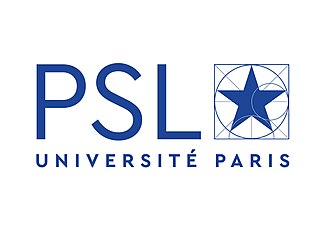École nationale des ponts et chaussées, also nicknamed Ponts ( ), formerly known as École des Ponts ParisTech, is a grande école in the field of science, engineering and technology, of the Polytechnic Institute of Paris, a public research university. Founded in 1747 by Daniel-Charles Trudaine, it is one of the oldest and one of the most prestigious French Grandes Écoles.

A grande école is a specialized top-level educational institution in France and some other previous French colonies such as Morocco and Tunisia. Grandes écoles are part of an alternative educational system that operates alongside the mainstream French public university system, and take the shape of institutes dedicated to teaching, research and professional training in either pure natural and social sciences, or applied sciences such as engineering, architecture, business administration, or public policy and administration.

Mines Paris – PSL, officially École nationale supérieure des mines de Paris, is a French grande école and a constituent college of PSL Research University. It was originally established in 1783 by King Louis XVI.

The University of Lyon is a university system (ComUE) based in Lyon, France. It comprises 12 members and 9 associated institutions. The 3 main constituent universities in this center are: Claude Bernard University Lyon 1, which focuses upon health and science studies and has approximately 47,000 students; Lumière University Lyon 2, which focuses upon the social sciences and arts, and has about 30,000 students; Jean Moulin University Lyon 3, which focuses upon the law and humanities with about 20,000 students.

IMT Nord Europe or École nationale supérieure Mines-Télécom Lille Douai is a French graduate school of engineering. It is located in the Hauts-de-France region, shared between 2 campuses: the science campus of the University of Lille ; and the city of Douai. It is accredited by the Commission des Titres d'Ingénieur (CTI) to deliver the French Diplôme d'Ingénieur.

The Technical University of Madrid or sometimes called Polytechnic University of Madrid is a public university, located in Madrid, Spain. It was founded in 1971 as the result of merging different Technical Schools of Engineering and Architecture, originating mainly in the 18th century. Over 35,000 students attend classes during the year.
The grands établissements are French public institutions under ministerial charter within the administrative category referred to as Établissements publics à caractère scientifique, culturel et professionnel (EPCSP).

École Nationale Supérieure de l'Électronique et de ses Applications is a graduate school of electrical engineering and computer science, located in Cergy close to Paris in France.

The Collège des Ingénieurs is an independent international educational institution founded in Paris, France in 1986 and known for its postgraduate management training. The training model is innovative for management training, it is exclusively aimed at engineers and scientists, directly following scientific education.

The École européenne de chimie, polymères et matériaux of Strasbourg is a public engineering school in the city of Strasbourg, in Alsace, France. It was founded in 1948, and is located on the Cronenbourg Campus of the University of Strasbourg. Each year 90 students graduate from the school with a diplôme d'ingénieur. It is a National School of Engineers, part of the University of Strasbourg and a member of the Fédération Gay-Lussac, which recruits from the common polytechnic entrance examination. It is also part of the Alsace Tech network of nine engineering schools in Alsace. The ECPM offers its students three specialties: chemistry, polymers or materials.
ParisTech is a cluster that brings together 7 renowned grandes écoles based in Paris, France. It covers the whole spectrum of science, technology and management and has more than 12.000 students.
French university associations known as "pôles de recherche et d'enseignement supérieur" were a form of higher-level organization for universities and other institutions established by French law in effect from 2007 to 2013. The 2013 Law on Higher Education and Research (France) discontinued the PRES; these have been largely replaced by the new Communities of Universities and Institutions. The list below indicates the status of those institutions designated as PRES or related associations before the 2013 law took effect. See the list of public universities in France for the current status of these institutions.

Institut Mines-Télécom (IMT) is a French public academic institution dedicated to Higher Education and Research for Innovation in the fields of engineering and digital technology, organized as a Collegiate University. Created in 1996, it was originally known as the "Groupe des écoles des télécommunications", or GET, followed by the "Institut Télécom". The Mines schools, which were placed under the administrative supervision of the Ministry of Industry, joined the Institut in March 2012 when it took on its current name and gained the status of Grand établissement. It combines high academic and scientific legitimacy with a practical proximity to business and a unique positioning in 3 major transformations of the 21st century: Digital Affairs, Energy and Ecology, and Industry. Its training and research for innovation are rolled out in the Mines and Télécom Graduate Schools. The Institut falls under the administrative aegis of the General Council for the Economy, Industry, Energy and Technologies.

The Community of Universities and Institutions (COMUE) Lille Nord de France was a French Groups of Universities and Institutions (COMUE) spread over multiple campuses and centered in Lille. It included a European Doctoral College and federated universities, engineering schools and research centers. With more than one hundred thousand students, it was one of the largest university federations in France. The University of Lille, with nearly 70,000 students, was its main component. The COMUE stopped its activity in 2019 and its activities were transferred to its founding institutions.

The Escola Politécnica of the University of São Paulo is an engineering school at the University of São Paulo (USP) in São Paulo, Brazil.

Paris Sciences et Lettres University is a public research university and Grand établissement based in Paris, France. It was established in 2010 and formally created as a university in 2019. It is a collegiate university with 11 constituent schools, with the oldest founded in 1530. PSL is located in central Paris, with its main sites in the Latin Quarter, at the Montagne Sainte-Geneviève Campus, at the Jourdan Campus, at Dauphine Campus, at Condorcet Campus, and at Carré Richelieu.

The Conférence des Grandes Écoles, is a French national institution, created in 1973. It mainly acts as an association of Grandes Écoles, providing representation, research and accreditation. A Grande école is a French institution of higher education that is separate from, but parallel and often connected to, the main framework of the French public university system.

The quartier du Val-de-Grâce is the 19th administrative district or 'quartier' of Paris, located in the 5th arrondissement of the city. Its borders are boulevard de Port-Royal to the south, boulevard Saint-Michel to the west, rue Soufflot, rue des Fossés-Saint-Jacques and rue de l'Estrapade to the north and rue Mouffetard and rue Pascal to the east.
COUPERIN is an academic consortium in France. Formed in 1999, it includes more than 250 universities, research organizations, Grandes écoles (schools), COMUE, and others. The consortium negotiates with publishers the prices and conditions of access to scientific publications and other digital resources for the benefit of its members. It promotes open science, particularly with regard to scientific publications, both nationally and internationally. It is headquartered in Paris.